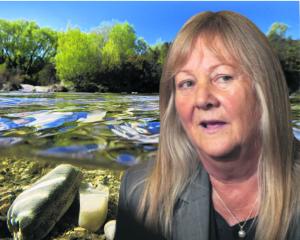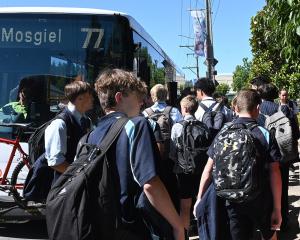
At a meeting of the council’s implementation committee yesterday, councillors were told four successive storms in July and August caused significant riverbank erosion and debris accumulation.
First estimates for fixing "river management issues" caused by the storms were $400,000, and cost estimates for some damage were yet to be determined.
Additionally, estimates for the Lower Clutha and the Lower Taieri flood protection and drainage schemes indicated many repair sites that could cost about $1.9 million.
However, Cr Kevin Malcolm said yesterday the damage wrought by floods could have been worse because gravel extraction from rivers was "dragging on".
For almost the entire duration of his first term at the council, there had been talk about removing gravel building up in sections of the Kakanui River and its tributary, the Kauru River, he said.
The community was concerned about the future of a bridge spanning the Kauru River.
"We were lucky in this last flood that it was a slow flood," Cr Malcolm said.
"If a fast flood came down there, because of the pile-up that is at that bridge, we are probably going to lose the bridge.
"If this was a river coming into South Dunedin and scouring out where houses were, everyone would be up in arms.
"It’s scouring out land, whether it be valuable or not; it’s threatening infrastructure."
Engineering manager Michelle Mifflin said there was no "overall Otago gravel management strategy" at the council.
However, the council was likely to move towards a gravel management model similar to the one used by Environment Canterbury and her team was taking steps towards those changes.
Staff had done an enormous amount of work to get to a point where the council could address hazard mitigation in Otago rivers relating to gravel build-up, she said.
However, she went on to say that removing gravel was "not a great thing" for rivers.
"What is also not a great thing for rivers is the infrastructure and the things we put in the river that intersect these natural processes," Ms Mifflin said.
"I’m hearing an issue that sounds to me like there is a significant piece of infrastructure that in a weather event is going to go: that’s not my understanding."
Cr Malcolm pointed to what residents were saying: "Well, that’s not what the locals are saying that understand the river."
Cr Gary Kelliher said gravel extraction was an issue raised by community members across the region and the incoming council needed to deal with it urgently.
Cr Carmen Hope said she too had recently spoken to "anxious people" at Balclutha asking about the issue.
Cr Michael Deaker called for engineering staff to put together a report reminding councillors of the role gravel extraction could play in the management of flood risk in the beds of rivers.
"And how this relates now to the modern concept of ‘let the river be a river’, of Te Mana o Te Wai, bring all those things together to remind present and future councillors of where gravel extraction sits in terms of flood management — what can and can’t be done through gravel extraction," he said.
Council operations general manager Gavin Palmer said he was not close enough to the issue about the Kauru River to comment on it at the meeting, but staff would talk about it to see what could be done.
More broadly, a repair programme for the flooding damage, including funding options, would be presented to councillors at the first practical opportunity, he said.
Advertisement













